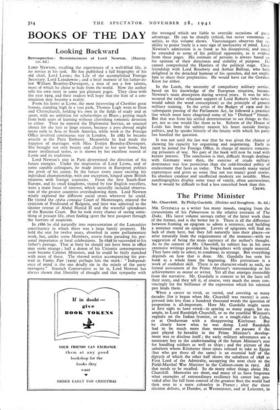BOOKS OF THE DAY
Looking Backward
Lorin NEWTON, recalling the experiences of a well-filled life, is no novice at his task. He has published a full biography of his old chief, Lord Lyons; the Life of the accomplished Foreign Secretary. Lord Lansdowne ; and a brief memoir of his father-in- law William Bromley-Davenport, a man of not a few talents, most of which he chose to hide from the world. Now the author tells his own story in some 300 pleasant pages. They close with the year 1919, and their readers will hope that the hint of a con- tinuation may become a reality.
From his home at Lyme, the most interesting of Cheshire great houses, standing high in a vast park, Thomas Legh went to Eton and Christchurch, holding his own in the fields of study and of sport, with no ambition for scholarships or Blues ; getting much from both seats of learning without cherishing romantic devotion to either. Then he entered the Diplomatic Service, an unusual choice for the heir to large estates, because a post abroad might mean exile to Asia or South America, while work at the Foreign Office involved continuous stay in London. In 1882 he became attaché at the Paris Embassy. Meanwhile he had made the happiest of marriages with Miss Evelyn Bromley-Davenport. She brought not only beauty and charm to her new home, but many intellectual tastes, as is shown by her excellent record of Lyme and its traditions.
Lord Newton's stay in Paris determined the direction of his future energies. Under the inspiration of Lord Lyons, and of some capable colleagues, he made interest in European politics the pivot of his career. In the future every cause exciting his individual championship, with one exception, hinged upon British relations with foreign countries. From the first South-East Europe, and its small kingdoms, visited by few English travellers, were a main focus of interest, which naturally included observa- tion of the greater countries overshadowing them. Lord Newton wisely explored the different social strata wherever he could. He visited the opera comique Court of Montenegro, enjoyed the cynicism of Ferdinand of Bulgaria, and later was admitted to the sinister retreat of Abdul Hamid II and the wasteful splendours of the Russian Court. But he took every chance of seeing some- thing of peasant life, often finding sport the best passport through the barriers of suspicion.
In 1886 he slid naturally into representation of the Lancashire constituency in which there was a large family property. He held the seat for twelve years, absorbed in some parliamentary work, but, unlike some Members, averse from parading his per- sonal importance at local celebrations. In 1898 he succeeded to his father's peerage. That at forty he should not have been in office may seem strange ; half a dozen of his Unionist contemporaries soon became Cabinet Ministers, and he could be fairly matched with most of these. The shrewd notice accompanying his por- trait in Vanity Fair (1909) perhaps hits the mark : " Independ- ence of mind is the one deadly sin in the minds of the party managers." Staunch Conservative as he is, Lord Newton has always shown that liberality of thought and that sympathy with
the wronged which are liable to override occasions of party advantage. He can be sharply critical, but never venomous or unfair, as this volume shows. Vauvenargues observes that in- ability to praise freely is a sure sign of mediocrity of mind. Lord Newton's admiration is as frank as his disapproval, and could be extended to some of his political opponents, as is evident from these pages. His estimate of persons is always based on his opinion of their directness and stability of purpose. He cannot comprehend the Hamlets of the political stage. Close friendship with Lord Rosebery and Arthur Balfour, who both delighted in the detached humour of his speeches, did not enable him to share their perplexities. He would have cut the Gordian Knot for either.
In the Lords, the necessity of compulsory military service, based on his knowledge of the European situation, became Newton's main absorption during several years. It was he who secured the rather reluctant support of Lord Roberts (who never would admit the word conscription) to the principle of general military training. In the crisis of the Budget of 1909 and the subsequent passing of the Parliament Act, he followed a practical line which must have chagrined some of his " Diehard " friends. But that was from his settled determination to see things as they are, not as one would like them to be. Reform of the House of Lords has been the subject nearest his heart outside foreign politics, and he speaks bitterly of the fatuity with which his party has handled the question.
It was not until the last war that he was given the chance of showing his capacity for organising and negotiating. Early in 1916 he joined the Foreign Office, in charge of matters concern- ing prisoners of war. No part of the book will now be read with keener interest. The conclusion is that, difficult though dealings with Germany were then, the exercise of crude military dominance was less pernicious than the cold-blooded policy of enslavement that faces us today. The book records many varied experiences and gives us some (but not too many) good stories. Its absolute candour and unaffected modesty are notable. Most autobiographies display some trace of vanity, often unconscious, but it would be difficult to find a less conceited book than this.
CREWE.


























 Previous page
Previous page